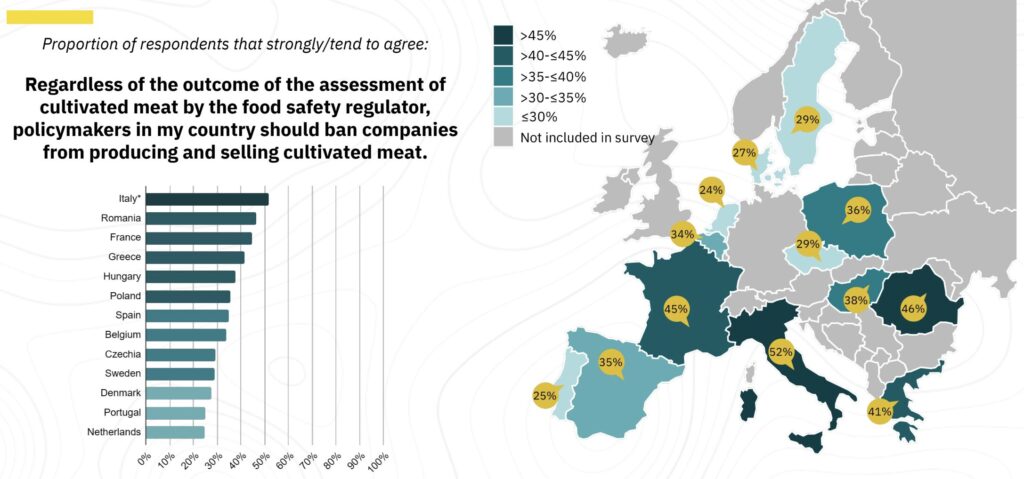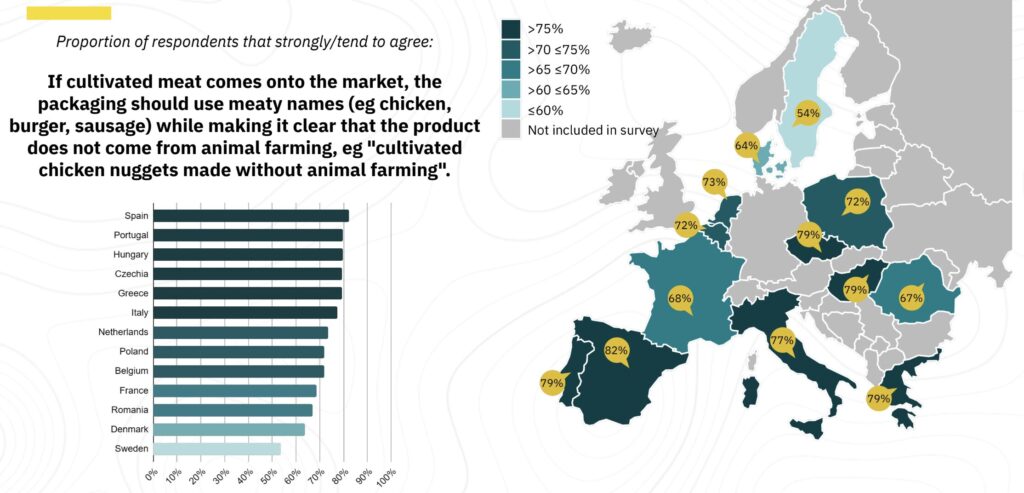Amid Orbán’s Threats of Bans, EU Consumers Say Eating Cultivated Meat Should Be Their Decision
6 Mins Read
Europeans are largely in favour of cultivated meat if food regulators deem it to be safe, despite policymakers debating bans over the novel food.
In Brussels, over an informal lunch that no doubt featured meat, European leaders last week discussed the merits of cultivated meat, stemming from Hungary’s notification to the EU that it plans to ban these proteins within its borders.
But in a sign of consumer intent, a new survey has found that most Europeans are against such restrictions, and want to have the freedom to decide whether they want to eat cultivated meat or not.
Covering over 16,000 people from 15 EU countries, the YouGov poll for the Good Food Institute Europe found that Europeans mostly support the sale of cultivated meat if it passes safety assessments from food regulators. This sentiment is most popular in Portugal (69%), Germany (65%), Netherlands and Austria (both 63%). The German and Austrian results are from a separate survey conducted in March.

The only countries where less than half of people oppose putting cultivated meat sale even after it’s okayed by regulators are Romania (49%) and France (48%), both countries that have floated the idea of banning the food and supported EU-wide efforts to restrict the industry’s progress.
“Cultivated meat must go through one of the world’s most rigorous regulatory processes before it will be available in the EU. This survey shows people across a wide range of countries believe that once it’s been approved, it should be down to consumers to decide whether or not they want to eat it,” said Seth Roberts, senior policy manager at GFI Europe.
EU citizens support meat-related terms on cultivated meat labels
The cultivated meat industry has some work to do in educating consumers, with the number of people who have heard about the food crossing 40% in only the Netherlands, Austria, Sweden and Germany. And just 21% of Italians say they know “a lot about cultivated meat”, the highest among the countries surveyed.

Most Europeans also seem to be against banning cultivated meat, with support for legislation lowest in the Netherlands (24%), Portugal (25%) and Denmark (29%). On the flip side, 52% of people in Italy back a ban – it is the first and only country to have passed legislation to do so.
Italy’s ban on cultivated meat was also accompanied by restrictions on the use of meat-related terms on plant-based product packaging, though this is now being reconsidered. France also introduced a similar ban, but this was suspended by its top court, which questioned the law’s legality.
The survey showed that – despite cited concerns about consumer confusion – Europeans are happy for cultivated meat products to use meaty names, as long as it’s made clear that they aren’t sourced from livestock farming. This sentiment was particularly strong across the EU, with majorities in every country, led by Spain (81%), Portugal, Hungary, Czechia and Greece (all 79%).

Respondents were more split on whether cultivated meat should receive R&D funding from governments, and if farmers should benefit from its opportunities. That said, Europeans are clear that if cultivated meat does come to market, it should be produced domestically, with only Romanians in the minority here (38%). Consumers further believe that decisions to approve cultivated meat should be independent of any commercial interests.
“It’s great to see so many Europeans are ready for its arrival as part of a diversified food system. Policymakers should recognise cultivated meat’s potential to boost food security by supporting this rapidly growing sector,” said Roberts.
EU leaders divided over cultivated meat
GFI Europe found that most Europeans are open to trying cultivated meat, with support highest in Portugal (63%), Czechia and the Netherlands (59%). Romania was the only country with less than four in 10 consumers willing to try cultivated meat at least once (35%).
However, when it comes to displacing meat, EU citizens are more hesitant. Less than a third (31%) of Dutch nationals would replace some of their current meat consumption with cultivated meat, and this is the highest among all countries. Romania is once again the least willing to do so (17%), alongside Greece. – in fact, both these nations have the highest number of people who say they’ll never eat cultivated meat (53% and 49%, respectively).

But most Europeans believe they’re eating too much meat, overwhelmingly so in Greece (79%), Portugal (74%) and Italy (70%). The latter two are also where consumer most want to reduce their meat intake (63% and 60%, respectively). It shows that at the moment, cultivated meat is leaving a little to be desired.
At the EU’s Agriculture and Fisheries (Agrifish) Council meeting earlier this month, a note by the Hungarian presidency called for efforts to “protect” Europe’s culinary traditions from novel foods like cultivated meat and plant-based analogues. It was received positively by Italy and Austria, which would come as no surprise given the two were leading similar efforts (alongside France) at the council’s January meeting.
However, leaders from Spain and Germany pushed back. “I was born in Valencia, and I feel very proud of paella, which is a great culinary tradition and a great product,” said Spanish agriculture minister Luis Planas, before adding that these traditional foods “should not be an excuse to put a blindfold on innovation in food production”.
“Allow me a democratic consideration: in the end, the one who is right is the consumer. And if the consumer asks for new products, we will have to take them into account,” he stated.

Cem Özdemir, Germany’s agrifood minister, echoed this sentiment. “I’m very proud of my local food… but I am not in favour of forcing people to eat this or that,” he said. “If people want novel foods, what’s wrong with it? It is the people that have to decide.”
Thanks to its rigorous and complex regulatory framework, no company has received approval to sell cultivated meat in the EU so far. Startups have been looking to more receptive markets like Singapore and the US. The pressure was racked up last week after the UK – a former EU member – became the first in the continent to clear cultivated meat for sale (greenlighting Meatly’s chicken for pets). Meanwhile, Switzerland (another non-EU state) is also reviewing an application for cultivated beef.



